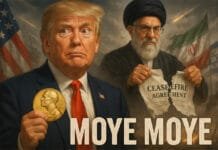Trump’s Declaration: “Hollywood Is Under Siege”
Taking to Truth Social, Trump warned of what he described as a coordinated global effort to cripple America’s film sector. He accused foreign governments of incentivizing U.S. filmmakers to move production abroad, calling it a national security threat.
“The film industry in the US is dying very fast. Other countries are giving every kind of incentive to drive our filmmakers and studios away from the US,” Trump wrote. “This is an organized effort by other countries and therefore it is a threat to national security.”
Trump claimed these aggressive incentives are systematically hollowing out Hollywood, which he says is being “destroyed” as a result.
White House: Final Decision Pending, All Options Considered
While the announcement created immediate ripples across the entertainment world, the White House offered clarification, stating that no final decision has been reached. However, White House spokesperson Kush Desai confirmed that “all options are being considered” in line with the former president’s directive.
“No final decision has been taken yet on the tariff of foreign films,” Desai said. “The administration is considering all options to fulfill President Trump’s directive to protect our country’s national and economic security while making Hollywood great again.”
The remark reinforced that Trump’s suggestion is under active review and could still evolve based on stakeholder feedback, legal constraints, and international diplomacy.
How Tariffs Could Reshape the Film Industry
American film studios have increasingly relied on international locations to manage production costs, benefit from tax rebates, and access global talent. Countries like Canada, the United Kingdom, Australia, and New Zealand have become essential hubs for U.S.-backed productions.
If the proposed 100% tariff takes effect, it would:
Dramatically increase production costs for any film shot outside the U.S.
Potentially cripple smaller production companies unable to sustain the new expenses
Force studios to reconfigure production pipelines
Impact release schedules and budgets of major upcoming titles
Place enormous pressure on streaming services dependent on international content
Studio Executives Scramble to Assess Risks
Leading U.S. studios, including Disney, Warner Bros., and Universal, are urgently evaluating how potential tariffs could affect long-term production strategies. Many rely heavily on overseas shoots to deliver high-quality productions within budget.
One executive, speaking on condition of anonymity, stated:
“This would fundamentally change our global model. We don’t shoot abroad for fun—we do it because it keeps us competitive. A 100% tariff would destabilize our cost structure and force a major industry reset.”
Streaming Platforms May Suffer Collateral Damage
Netflix, Amazon Prime Video, Hulu, and Disney+—all of which invest in original programming across the globe—could be significantly affected. A tariff on foreign content could:
Discourage or delay the licensing of international content
Prompt subscription price increases to offset rising costs
Lead to a reduction in foreign-language offerings
Jeopardize ongoing production deals in countries like India, South Korea, and Germany
Smaller, independent platforms offering foreign cinema may face an existential threat, unable to absorb the drastic cost inflation.
International Reaction Builds
Governments from key film-exporting nations have begun responding to the controversial proposal. Canada’s Ministry of Heritage, Australia’s Screen Australia, and the British Film Institute (BFI) have called for diplomatic engagement, voicing concern over the damage this tariff could inflict on international film trade and artistic collaboration.
An official from the UK Department for Digital, Culture, Media and Sport emphasized:
“Film is both commerce and culture. Tariffs of this scale would not only disrupt our economies but also stifle cross-cultural exchange, which is vital in today’s globalized media ecosystem.”
Trade Lawyers and Policy Analysts Sound Alarms
Legal experts point out that imposing a 100% tariff on foreign films may violate existing trade agreements, including the USMCA, WTO rules, and various bilateral treaties. Analysts predict swift legal challenges from international governments and industry groups.
According to Melanie Parker, a senior trade policy analyst:
“It’s highly unlikely this tariff could move forward without major legal scrutiny. Retaliation from other nations is almost certain, and U.S. exports—including films and media—could suffer in return.”
Domestic Repercussions: Jobs, Unions, and Small Studios
While the intention behind the tariff may be to bring jobs back to the U.S., not all domestic stakeholders are in support. Film unions, crew associations, and location service providers warn that such measures could create unintended consequences:
Union jobs could decline if studios scale back production amid rising costs
Local film commissions might lose out on funding and infrastructure support
Independent American filmmakers could face barriers when distributing or co-producing with foreign partners
A Risky Road to “Make Hollywood Great Again”
Trump’s concluding message—“Make Hollywood Great Again”—has fueled speculation that the move is aimed at reigniting nationalistic pride in the U.S. film industry. However, many critics argue that such aggressive trade protectionism could result in isolation rather than innovation.
While some support a shift toward domestic production, others caution against dismantling the intricate web of global cooperation that now defines modern filmmaking.
What Comes Next?
The film industry, trade experts, and governments worldwide are anxiously awaiting further clarification from Washington. Whether the proposal will pass into formal policy or remain a provocative statement remains unclear. What is certain, however, is that the global entertainment industry has been put on high alert.
Studios are adjusting schedules, policymakers are preparing responses, and the world watches to see if the U.S. will truly impose a 100% tariff on all foreign-made films—a move that could reshape entertainment economics for decades.
















